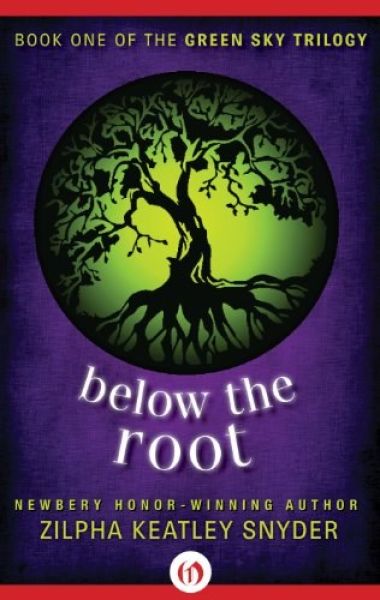Deconstructing “the Chosen”
Below the Root (Green Sky Trilogy, volume 1)
By Zilpha Keatley Snyder

10 Feb, 2016
0 comments
Zilpha Keatley Snyder’s 1975 novel Below the Root is the first volume in her Green Sky Trilogy; the subsequent volumes were 1976’s And All Between and 1977’s Until the Celebration. Not only is this the first Snyder I have knowingly read … until this review was commissioned, I had never heard of this prolific Newbery winner. It just goes to show there is always more to learn.
All hail the Chosen One! Or at least a Chosen one; young Raamo D’ok’s psychic abilities earn him a position as a trainee Ol-Zhaan, the ruling class who govern the world of Green Sky. Even before his training begins, selection brings with it status and respect, a development that baffles Raamo. He has as yet done nothing to earn respect.
It is not the only false note in Raamo’s world.
It is clear something has gone wrong on Green Sky. Each year, children lose their psychic powers at a younger age, more people are hopelessly addicted to dream berries, and the Root, the mysterious, magical plant on which all proper society depends, is dwindling. The facts are undeniable: Green Sky is a society in decline.
It must be someone’s fault! That standard scapegoats are the Pash-shan. They are said to be monsters imprisoned beneath the Root, monsters always plotting against their betters. Dire tales are told. Children who wander too close to the gaps in the Root system are dragged down to become slaves; careless adults are captured and eaten. Perhaps now the monsters are plotting an escape!
A very convenient, comfortable explanation. Pity it does not seem to be supported by the facts. As Raamo slowly realizes, much of what he has been taught as fact is either misleadingly incomplete or an outright lie. Green Sky’s problems cannot be blamed on some malign outside force. The fish rots from the head; the rulers, the Ol-Zhaan, are themselves the culprits. The irony is their motives are arguably pure, even if their methods and results are not.
And the Pash-shan are their victims, just like the lesser folks living above ground.
~oOo~
It isn’t so surprising that Everything Raamo Knows is Wrong, because there’s not much of a plot if everything he knows is right1. The book hinted at this in unsubtle fashion. I would have preferred less of the clumsy foreshadowing, but then I am not the target market. Juvenile readers might need bigger, brighter clues than someone of my sophistication and years. Decades.
Yet even when I tried to imagine how this would have read when I was an impressionable young kid, I came away dissatisfied. It’s not just that so many of the plot twists are familiar tropes (supposed monsters not being monsters, sanctimonious rulers being thoroughly corrupt). These might not be clichés for the intended readers. I can tolerate the author’s fondness for names sprinkled with apostrophes, because for all I know hy’phenated na’mes in fan’tasy were still new and exotic in the 1970s. I don’t fault it because the worldbuilding makes no sense, because the ruling class is lying through its teeth about history; the inconsistencies are not errors, they are clues.
My real problem is that even as a kid, I would have been put off by the lack of a proper ending. It just .…stopped. If you wanted to know how it turned out, you would have to buy the next book — and the next.
I understand that there are other people out there who like incomplete books. They read Throne of Games and Time of Wheel and beg for more, story without end, amen. The world is big enough to encompass both people who are right, like me, and people who are completely wrong, like them. But whatever floats your boat.
Given that the author published over forty novels in the course of her career and won a pretty impressive set of Newbery awards, I suspect I am in the minority here. You may well like this book more than I did. The good news is it is easily available. I recommend if you do buy it, you buy the entire trilogy. All or nothing.
A discussion of the computer game inspired by the trilogy may be found here.
1: I can think of a few stories in which the twist is that the protagonist discovers that everything society told him or her was right, while the protagonist’s firm beliefs were delusions: Heinlein’s “Coventry” is one; Darnay’s The Purgatory Zone may have been another (it has been a while since I read it).
